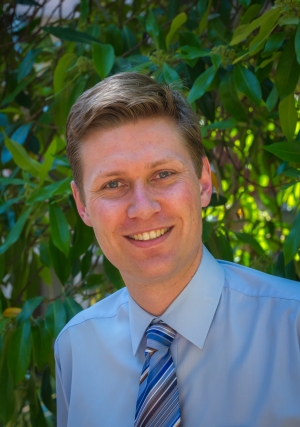New hope for autism
Research news
Practitioners are one step closer to being able to treat people with Autism Spectrum Disorders (ASDs), thanks to recent research involving Deakin's new Cognitive Neuroscience Unit.
Deakin's Associate Professor Peter Enticott and other researchers from the Unit, in collaboration with colleagues from the Monash Alfred Psychiatry Research Centre, have achieved statistically significant improvements in the social behaviour of people with Asperger's Disorder and high functioning autism, through the use of brain stimulation.
The research project was funded by a "Young Investigator Award" presented to Professor Enticott from the US Brain and Behaviour Research Foundation.
If such improvements are shown to be sustained in follow-up research, this treatment could substantially improve the quality of life of people in this group, particularly in relation to their ability to participate in society - and it has implications for the treatment of those with more severe autism.
"The typical scenario for people with an ASD is that they have fantastic skills, such as organisational abilities and focus, but many have trouble holding down a job because of the social demands.
"If we can help to improve their social interactions, we could enable them to participate much more fully in society," said Associate Professor Enticott, who is Director of the new Unit.
In the study, researchers used magnetic stimulation of the brain to lessen social anxiety or impairments and improve understanding of other people's thoughts and feelings.
The treatment was provided via a magnetic stimulation device that targeted areas of the frontal lobe that are known to affect social understanding. It is believed that the stimulation strengthens connections within this area of the brain.
The study involved 30 people, who either had Asperger's Disorder or high functioning autism, with half receiving a placebo, and the other half receiving stimulation every day for 15 minutes over a two-week period. This latter group demonstrated significant improvements one month after conclusion of the treatment.
"People don't grow out of Asperger's Syndrome or autism - and there are currently no verified medical treatments available - so this new research could be a milestone in the development of an effective treatment," said Professor Enticott.
He added that adults with autism have been a neglected portion of the ASD population, with most interventions tapering off before children reach their teens.
"It is estimated that one in 68 people have an autism spectrum disorder, so there is a huge need for effective treatment," he said.
"Technology is now providing unprecedented insights into the workings of the brain - and we are optimistic that neuroscience will offer more and more treatment opportunities for a range of areas of brain impairment."
Having completed his psychology degree at Deakin, Associate Professor Enticott returned to Deakin last November to establish the Cognitive Neuroscience Unit in the School of Psychology. He spent the previous seven years forging an international reputation in autism research at the Monash Alfred Psychiatry Research Centre.
The new Unit brings together the cognitive neuroscience activities of the School of Psychology and is home to more than 30 researchers and PhD students, and around 40 fourth-year students.
Research areas include concussion, language impairments, health psychology, eating disorders, motor dysfunction and memory - and there is a focus on studying how healthy brains facilitate processes like thinking, feeling, decision making and behaviour.
Associate Professor Enticott developed his passion for autism research early in his career and is very optimistic that real improvements can be achieved for people with autism. His Unit is involved in various studies looking at how brain stimulation might be used to better understand and treat ASDs.
The Unit is one of only three large research groups in the world focussing on autism treatment through brain stimulation and Professor Enticott is currently overseeing discussions with the other two groups that aim to establish a multi-site international trial on brain stimulation for people with ASDs.
"It usually takes a long time for research to translate into clinical practice," he said, "but these initial results with brain stimulation are so promising that we hope to fast track the research and make the treatment available within five to ten years."
Share this story
 Director of Deakin's new Cognitive Neuroscience Unit, Associate Professor Peter Enticott.
Director of Deakin's new Cognitive Neuroscience Unit, Associate Professor Peter Enticott.
